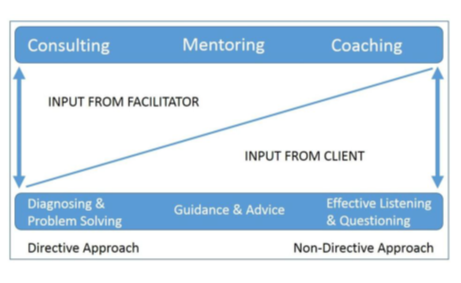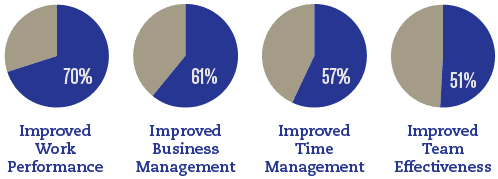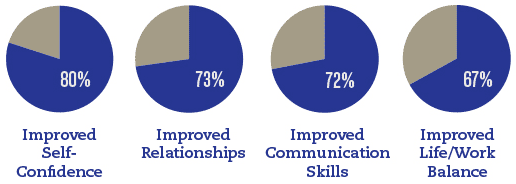Coaching targets performance and improvement and focuses on specific skills and goals. It is a non-directive form of development whereby the coach seeks to raise the coachee’s self-awareness. Personal issues, personality preferences and areas of improvement are also addressed.
Mentoring utilises many of the skills of a coach such as questioning, listening and reframing but is a more directive approach. The mentor is most likely to be from outside the organisation and will be a more senior or experienced figure offering insights from their own career. The following table highlights the key differences in approach.
Coaching |
Mentoring |
| Non-judgemental | Brings judgement and suggestions |
| Unlocks potential | Suggests where potential may be un-locked |
| Defined short-term sessions | Undefined ongoing relationship |
| Elicits self-discovery | Points to areas for consideration |
| Opens door to realising options | Brings expertise and experience |
| Dispels limiting barriers | Shows how barriers might be overcome |
| Brings listening and reflective presence | Gives of experience |
| Best if qualified with access to developmental tools | Best if senior, wiser figure from outside the organisation
|
It is important that the coach does not give advice. Coaching is centred around the client; whereas advising tends to be based on the beliefs, values and opinions of the advisor. The coach’s role, and the coaching concept, is to help the other person find their own solutions. The diagram below highlights this differentiation. The untrained coach or the inexperienced mentor is in danger of invalidating their approach and impact if they muddle the two very distinct roles.

When to coach
The Institute of Leadership and Management (ILM) carried out research with leadership and development managers across 250 large organisations in 2011. Their paper ‘Creating a Coaching Culture’ highlighted that coaching should not be used as a remedial tool: “Good coaching is about achieving a high-performance culture, not managing a low-performance one.”
The Association for Coaching identifies the following as the reasons why organisations are likely to select coaching as a development tool:
- Identify talent and potential leaders and support their growth as part of a retention strategy and succession planning
- Improve communication, where the blocks are not technical but personal
- Solve problems and improve decision-making
- Support organisational and culture change
- Develop leaders and improve management style
- Support individuals to raise their performance and develop a more strategic perspective especially just before or after a promotion to a more senior role
- Improve individuals’ performance in certain skills, especially where the blockage is not technical but personal
- To deal with conflict situations to bring resolution
- Support team development and cohesion
- Support career change and transitions
- Support exit from the organisation
Reference: Guidance for Coaching in Organisations, Association for Coaching 2004 & CIPD Fact Sheet 2020
The Benefits of Coaching
Some of the main benefits of coaching are that it helps leaders raise their self-awareness, learn about what might be holding them back or hindering their success, improve their self-confidence, increase their gravitas and ensure better communication skills. It can help leaders become more authentic and make it easier for them to inspire, motivate and influence those around them.
The resurgence in coaching interventions as a preferred development tool is supported by a number of studies. The International Coaching Federation (ICF) reported the impressive figures below.



